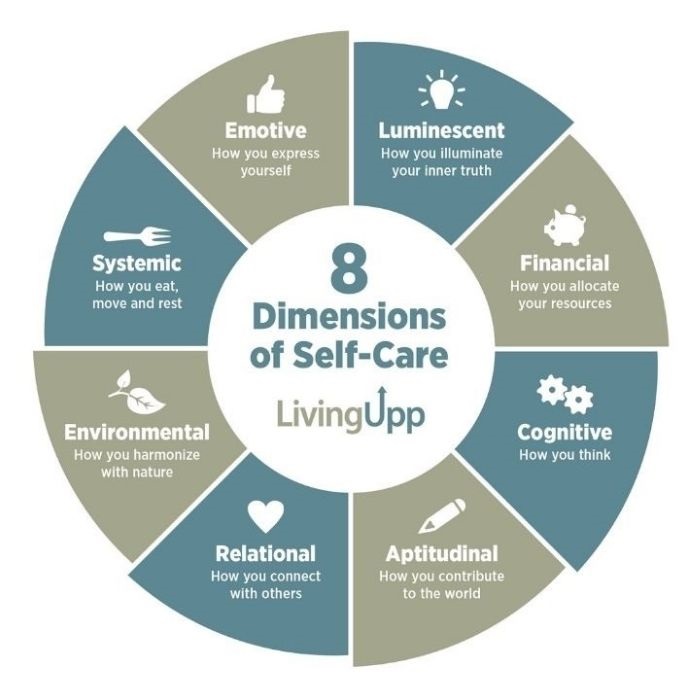The Aptitudinal Dimension of Self-Care, one of LivingUpp’s 8 Dimensions of Self-Care, focuses on your life’s work—how you make a meaningful contribution to the world using your unique strengths. This dimension of self-care helps you live up to your highest potential by finding creative ways to use your skills and talents.
In this article, you’ll learn how the aptitudinal dimension of self-care can help you find career alignment and a deeper sense of purpose.

LivingUpp is a participant in affiliate programs, which means we may earn a small commission from qualifying purchases on links to Amazon and other sites at no additional cost to you.
What is Aptitudinal Self-Care?
Aptitudinal self-care, sometimes called occupational self-care, is any action you take to support your life’s work. Over time, the small ways you enlist your strengths can have a big impact on your health.
LivingUpp defines self-care as a preventive health strategy involving actions and behaviors that improve, restore, or maintain good health. By implementing a holistic self-care practice, you’ll spend less time and money on sick care and more time living your life.
Examples of Aptitudinal Self-Care
Here are some aptitudinal self-care examples to help you design a healthy lifestyle:
Strengths
Using your strengths on a daily basis can increase your overall level of happiness. In Flow, author Mihaly Csikszentmihalyi describes this as a “state in which people are so involved in an activity that nothing else seems to matter; the experience itself is so enjoyable that people will do it even at great cost.”
In a state of flow, work feels more like play. And that’s when you know you’re aligned with your purpose. If your current role doesn’t offer opportunities to use your strengths, consider seeking out projects that do. It might just open doors for promotions or new career paths.
Aptitudinal self-care strategies that support your strengths:
- Using your strengths on a daily basis
- Finding a mentor
- Finding unique ways to use your strengths
- Working with a career coach
- Building onto your strengths
Time-Management
We all have the same number of minutes in each day, but how we choose to manage that time determines our success. Examine your daily routines closely to identify time drains. If you hear yourself saying “I can’t” or “I don’t have time” a lot, be honest: How much time do you spend scrolling through social media or watching TV?
Using your time effectively and efficiently can be the difference between achieving your goals and wishing your life was different.
Aptitudinal self-care strategies that support time-management:
- Using a planning system
- Designating time for self-care
- Setting healthy boundaries around work/family time
- Setting boundaries effectively
Capacity
When we’re focused and passionate, it’s easy to overdo it. Entrepreneurs are notorious for overfunctioning, but there are plenty of other professions and personality types that are prone to regularly stretching themselves beyond their capacity as well.
Know the signs that you’re overcommitted or overscheduled. Do you feel anxious? Does the quality of your work decline? Are you short-tempered?
Make it a habit to weave self-care into your daily schedule. Downtime can even boost your creativity and problem-solving skills.
Aptitudinal self-care strategies that support honoring your capacity:
- Learning how to say ‘no’ with grace and respect
- Delegating
- Establishing an evening self-care practice
- Using your vacation time
- Asking for help when you need it
- Recognizing when you’ve reached your limits
- Renegotiating roles and responsibilities
Using the 8 Dimensions of Self-Care Framework
The 8 Dimensions of Self-Care framework simplifies the healthy lifestyle design process. Using the 8-dimensional self-care pinwheel, you can easily develop a holistic self-care practice that supports the key areas of your life.
Here’s a quick overview of the 8 Dimensions of Self-Care:
- The Systemic Dimension of Self-Care: How you eat, move and rest
- The Emotive Dimension of Self-Care: How you express yourself
- The Luminescent Dimension of Self-Care: How you illuminate your inner truth
- The Financial Dimension of Self-Care: How you allocate your resources
- The Cognitive Dimension of Self-Care: How you think
- The AptitudinalDimension of Self-Care: How you contribute to the world
- The RelationalDimension of Self-Care: How you connect with others
- The Environmental Dimension of Self-Care: How you harmonize with nature
If you’re looking for some structure to help bring self-care into your daily life, the Lifestyle Design Planner incorporates the 8 Dimensions of Self-Care framework and the Rate Your 8 self-care assessment tool into its daily planning pages. This makes it easier to prioritize and plan your self-care rituals.
How to Support Your Aptitudinal Dimension of Self-Care
The Aptitudinal Dimension of Self-Care plays an integral role in building and maintaining good health. To design an aptitudinal self-care practice, choose specific self-care strategies that strengthen your professional work.
You may need to experiment with different forms of self-care to determine what is and what isn’t effective for you. Over time, you’ll be able to curate a collection of self-care activities that align with your needs and your personal brand.
Information on this website should not be interpreted as providing or replacing medical advice, diagnosis, or treatment. All content is intended for adults over the age of 18. LivingUpp is a participant in affiliate programs, which means we may earn a small commission from qualifying purchases on links to Amazon and other sites at no additional cost to you.
Originally published 3/20/2020
